Witnessing Ecumenism in Action at the World Council of Churches General Assembly
October 5, 2022 | Featured, International, Multicultural Relations, Public, Students
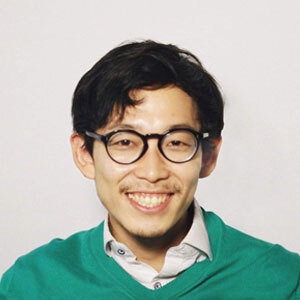
My first encounter with the World Council of Churches was through Kyungdong Church in Korea, founded by Kim Chai Choon, who studied at Princeton Seminary in the 1920s as a colonial subject of imperial Japan. He was a classmate of Han Kyung-Chik at Princeton Seminary, and these two giants of Korean Protestantism insisted Korean Christians participate in the World Council of Churches in spite of Korea’s fragile state after the Korean War.
For the 500th anniversary of the Reformation, Kyungdong Church visited Geneva. We met with a WCC staff who works on Korea. I was most interested in how WCC helped broker dialogue between South Korean and North Korean Christians in the 1980s and sought ways to reconcile the two Koreas, as my dissertation is on peace and unity in Korea.
When I arrived at Princeton Seminary last year, I sought ways to attend the 11th WCC General Assembly in Karlsruhe, Germany this year. I reminded faculty and administrators of the Seminary’s global footprint, and thought the legacy of Princeton Seminary alum and trustee Eugene Carson Blake alone ought to ensure our sustained participation in WCC. A collaborator of Martin Luther King Jr., Blake was the only American to have served as the general secretary of WCC. When the Seminary registered me to represent it at the WCC assembly, I was thrilled to partake in the feast of ecumenism at the cradle of Reformation.
I checked in at Festplatz convention center in Karlsruhe to get a lanyard with my name and picture on it. People looked at me with awe when they saw “Princeton Theological Seminary” under my name and assumed I’m theologically refined. Most participants had denominations that sent them under their name, and Duke, Vanderbilt, Boston University, and University of Chicago were the only other American seminaries whose students I met at the assembly.
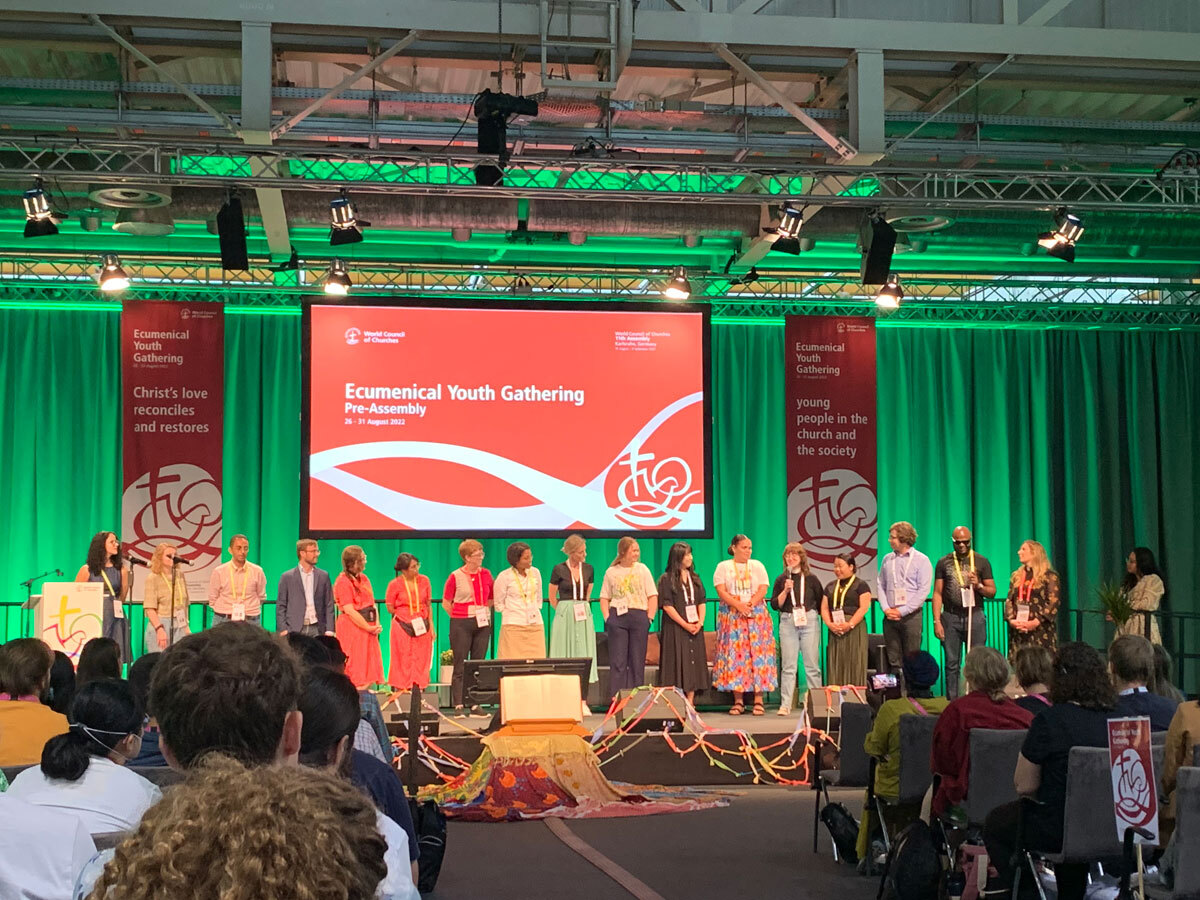
The leaders of the Ecumenical Youth Gathering are introduced on stage
I arrived a few days before the General Assembly to attend one of WCC’s pre-assemblies called Ecumenical Youth Gathering (EYG). While I had just aged out of being a youth as WCC defines youths as between 18 and 30, they let me come as an observer when I shared my passion for young adult ministry. I remember fondly these first few days of EYG. I reunited with friends from around the world whom I met at the WCC Pilgrimage for Peace and Justice in Korea three summers ago.
One of them was a youth member of the Russian delegation. He had mentioned in Korea that he was concerned that Russian Orthodox priests could not marry after ordination, as his call had not come with a ring yet. Since then, he was married, ordained, and had even adopted a puppy. Although a pandemic and a war had ruptured our worlds since we last met, I found comfort that we could still pray and break bread together.
Some American Christians had clamored for the expulsion of the Russian Orthodox Church from WCC after the Russian invasion of Ukraine, and the WCC Central Committee deliberated the proposal in June. During the opening plenary, the WCC General Secretary explained the mission of WCC is to be a platform for dialogue and relationships.
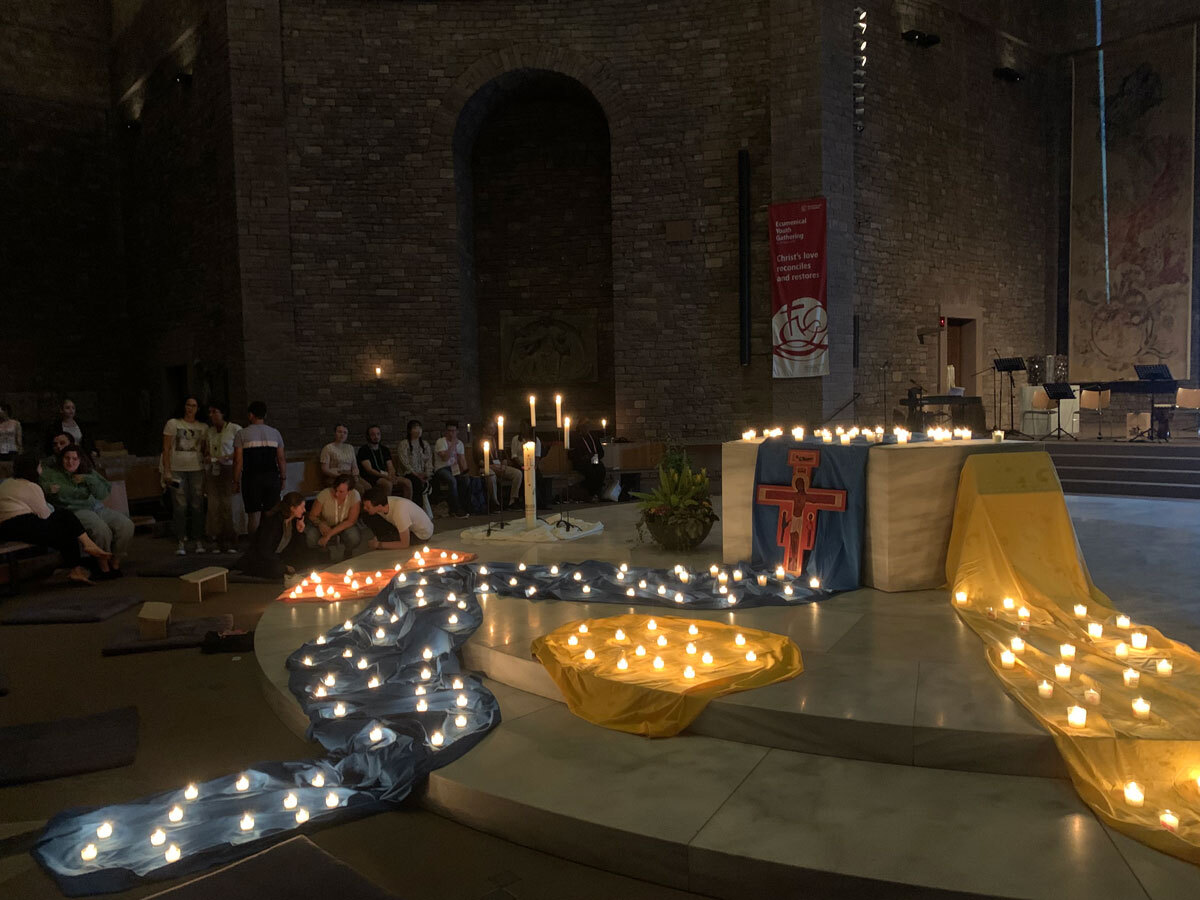
EYG’s opening worship service
The opening service of EYG was a candlelit Taize Vespers at a local Catholic church. Some 400 youths from the four corners of the globe had trickled into Karlsruhe, and we were told that we need to embody Christ to those without Christ, and embody unity in diversity as in Trinity. I also relished a chance for fellowship with WCC General Secretary Ioan Sauca, a Romanian Orthodox reverend. He was waiting in line for food behind us, and when we asked him to join us, he gladly accepted. With candor, wit, and wisdom, he answered our questions about WCC.
Like the General Assembly, EYG included daily prayer and worship, Bible study, workshops, church visits, communal meals, and plenary and business meetings, including the drafting of a youth report endorsed at the General Assembly. A highlight for me at EYG was the culture night, as it was exhilarating to see youths from every continent bring their whole selves and cultures to Christ through music, dance, and prayers. I kept returning to H. Richard Niebuhr’s 1951 classic Christ and Culture to conceptualize how the gospel indigenizes, as I believe the dialectic between systolic Christ and diastolic culture is the heartbeat of Christianity.
After five days of youth gathering, the assembly population swelled to some 4,000 from 200 denominations in 100 nations. The opening worship was electrifying, as we gathered under a tabernacle and worshipped in several tongues. But we also lost some of the intimacy of the EYG, as we split from dining under one roof into several tents. Fortunately, there was still a sense that I could join any table, and WCC also began to serve beer during dinner.
I was moved by how much WCC and Germany had prepared for us. We were welcomed by the mayor of Karlsruhe and the president of Germany, and the first night’s celebration concluded with a concert at the town plaza. Ubiquitous in the city were banners with the assembly theme “Christ’s Love Moves the World to Reconciliation and Unity,” and residents of Karlsruhe greeted us with warmth and curiosity in their churches and on the streets. I felt that it was important for us to rejoice on the first day, as our agenda raised some thorny conversations including war and sexuality with Christians on both sides.
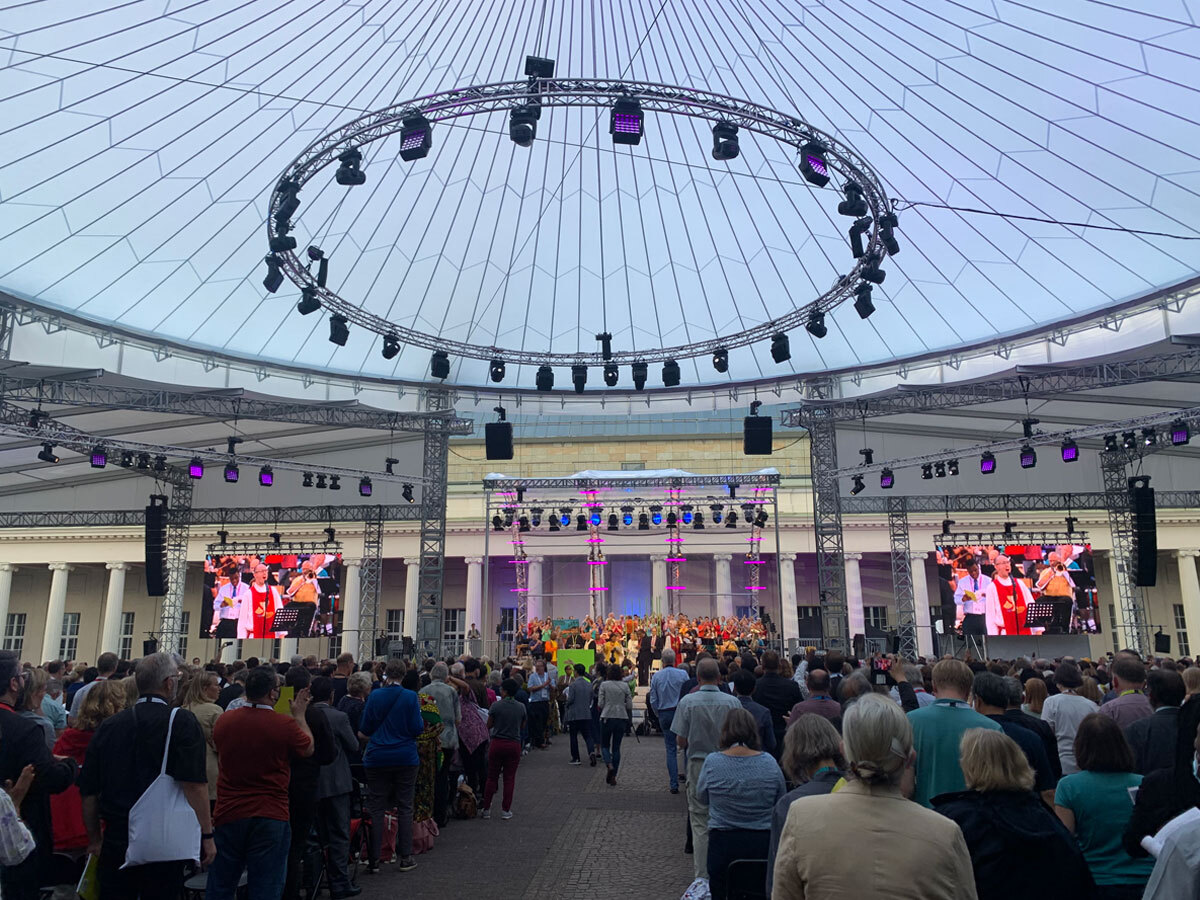
WCC General Assembly’s opening worship service
The General Assembly opened with a reflection on stewardship for creation, and we heard from indigenous peoples near the North Pole and the Equator at the vanguard of climate change. Another day was dedicated to the war in Ukraine seen through the parable of the Good Samaritan. I was disappointed that we did not hear from any Russians, who are also bearing the brunt of the war they did not choose. Ukrainians spoke courageously and persuasively about their plight, and a Russian delegate commented on the last day that the WCC position paper on Ukraine was not as bad as he had anticipated. WCC affirmed that “war is incompatible with God’s very nature.”
Israel/Palestine also elicited heated discussions during the assembly. WCC felt compelled to issue a statement as the member churches in the Holy Land reported intensifying persecution against them this year. After hearing from Christians in the Middle East, a delegate of my denomination, Presbyterian Church (USA), proposed labeling Israel an apartheid state, which a German Lutheran delegate rebuffed as anti-Semitic. To add nuance to the complexity, the assembly invited Muslims and Jews to share their perspectives.
I was glad I was not among the 400 delegates from 200 denominations who sat at the front of the meetings and lifted blue and orange cards to vote on motions and indicate whether they agreed or disagreed with the speaker. I learned that ecumenical work moves glacially slow, as WCC operates on consensus.
Not needing to attend business meetings freed me to attend workshops, prayers, and booths that interested me, and I went to several events on peace and reconciliation in Korea. Antonia Klumbies, a German exchange student at Princeton Seminary last spring, also accompanied me to a workshop. After the assembly, she gave me a tour of her nearby alma mater Heidelberg, the oldest university in Germany, which was ensconced in a quaint medieval town.
While I was the only current Princeton Seminary student at the assembly, I met several recent alums, such as David Smith, Zachary Pearce, and Ben Jacuk, who were invited as speakers or delegates. I also heard Princeton Seminary alum Rev. Angelique Walker-Smith’s speech prior to her election as the North America President of WCC. Princeton Seminary alum and professor Raimundo Barreto was also elected to serve on the WCC central committee. I became the preceptor for his World Christianity class in Germany, and he graciously invited me to dine with his friend Brian Stanley, a renowned historian of World Christianity.
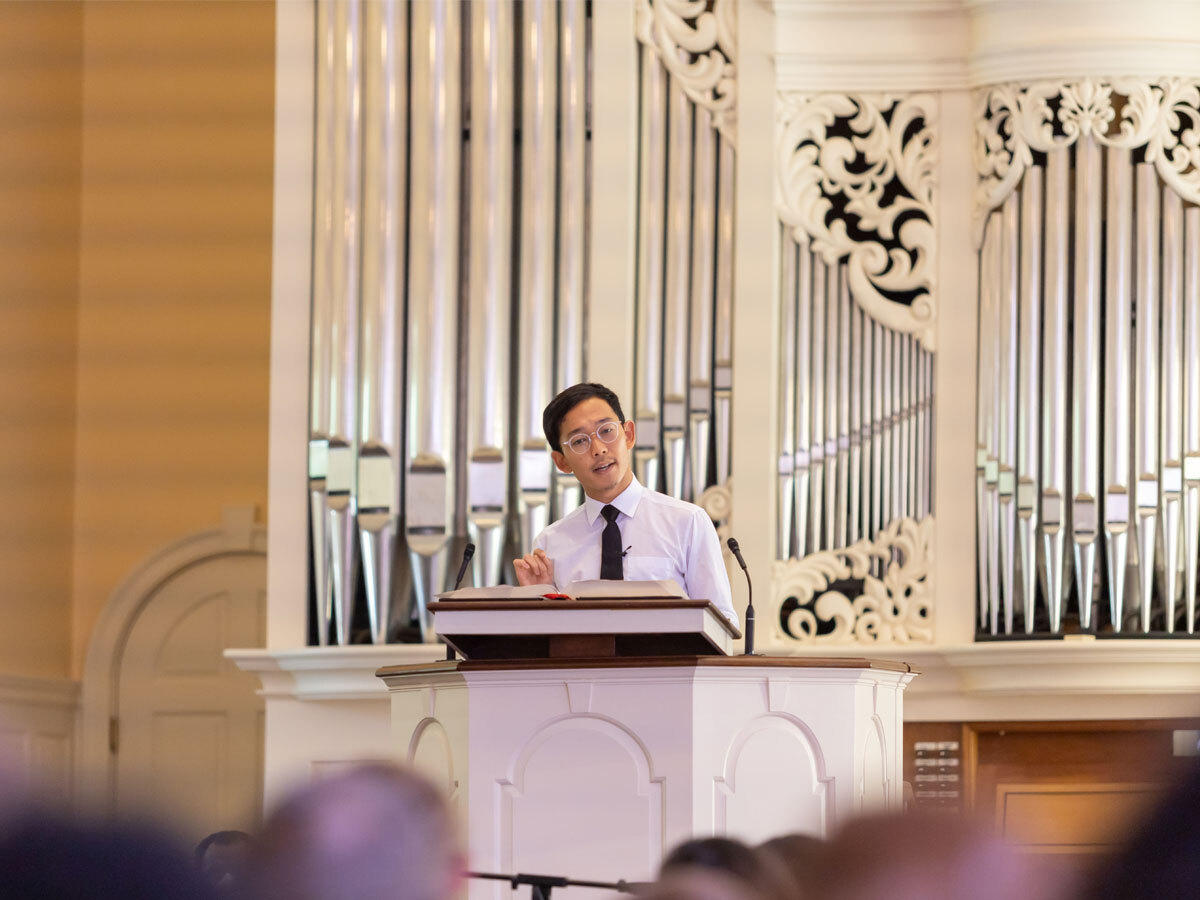
Lee leading worship in Seminary Chapel
A day after I returned from Karlsruhe, I helped with the international student orientation at the Farminary. I met new seminarians from nations across the globe, including Egypt, Korea, Myanmar, and Nigeria. I realized that I had met Christians from all these countries in Karlsruhe, and in many ways, Princeton Seminary is a microcosm of WCC.
Last month, I hosted a WCC-themed service at the Seminary Chapel as I would love to see more of our students, faculty, staff, and alums at the next WCC General Assembly. I will hopefully be there as a Princeton Seminary alum, and I look forward to reuniting with friends from Karlsruhe to share how we did justice, loved kindness, and walked humbly with God.





